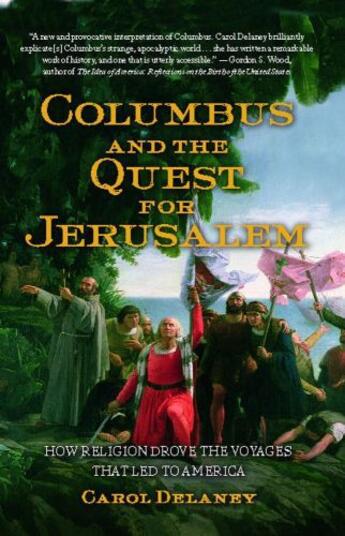-
Nombre de pages : (-)
-
Collection :
(-)
-
Genre :
(-)
-
Thème :
Non attribué
-
Prix littéraire(s) :
(-)
Résumé:
FIVE HUNDRED YEARS AFTER HE SET SAIL, the dominant understanding of Christopher Columbus holds him responsible for almost everything that went wrong in the New World. Here, finally, is a book that will radically change our interpretation of the man and his mission. Scholar Carol Delaney claims... Voir plus
FIVE HUNDRED YEARS AFTER HE SET SAIL, the dominant understanding of Christopher Columbus holds him responsible for almost everything that went wrong in the New World. Here, finally, is a book that will radically change our interpretation of the man and his mission. Scholar Carol Delaney claims that the true motivation for Columbuss voyages is very different from what is commonly accepted. She argues that he was inspired to find a western route to the Orient not only to obtain vast sums of gold for the Spanish Crown but primarily to help fund a new crusade to take Jerusalem from the Muslims--a goal that sustained him until the day he died. Rather than an avaricious glory hunter, Delaney reveals Columbus as a man of deep passion, patience, and religious conviction. Delaney sets the stage by describing the tumultuous events that had beset Europe in the years leading up to Columbuss birth--the failure of multiple crusades to keep Jerusalem in Christian hands; the devastation of the Black Plague; and the schisms in the Church. Then, just two years after his birth, the sacking of Constantinople by the Ottomans barred Christians from the trade route to the East and the pilgrimage route to Jerusalem. Columbuss belief that he was destined to play a decisive role in the retaking of Jerusalem was the force that drove him to petition the Spanish monarchy to fund his journey, even in the face of ridicule about his idea of sailing west to reach the ast. Columbus and the Quest for Jerusalem is based on extensive archival research, trips to Spain and Italy to visit important sites in Columbuss life story, and a close reading of writings from his day. It recounts the drama of the four voyages, bringing the trials of ocean navigation vividly to life and showing Columbus for the master navigator that he was. Delaney offers not an apologists take, but a clear-eyed, thought-provoking, and timely reappraisal of the man and his legacy. She depicts him as a thoughtful interpreter of the native cultures that he and his men encountered, and unfolds the tragic story of how his initial attempts to establish good relations with the natives turned badly sour, culminating in his being brought back to Spain as a prisoner in chains. Putting Columbus back into the context of his times, rather than viewing him through the prism of present-day perspectives on colonial conquests, Delaney shows him to have been neither a greedy imperialist nor a quixotic adventurer, as he has lately been depicted, but a man driven by an abiding religious passion.
Donner votre avis















